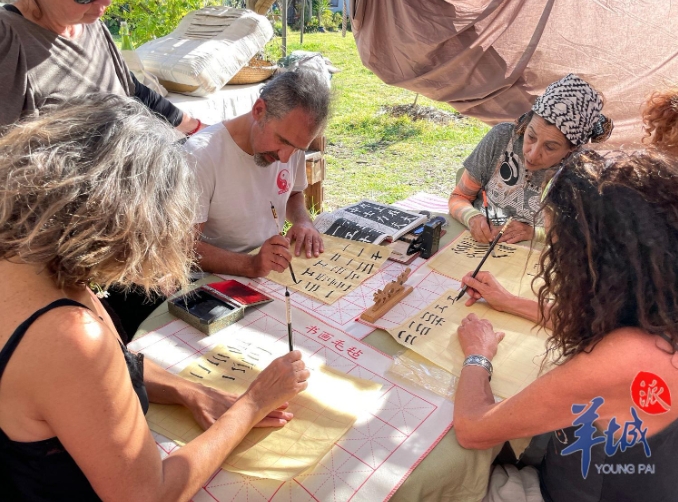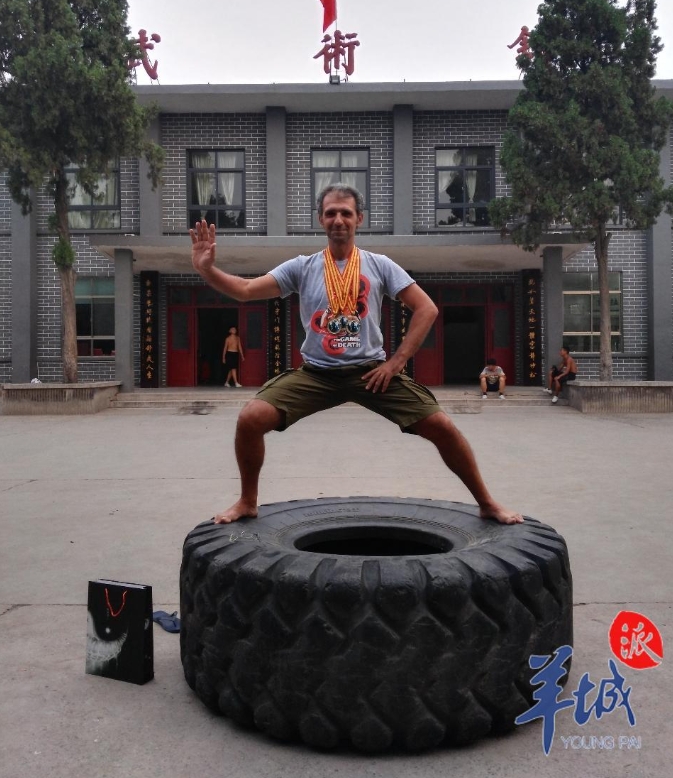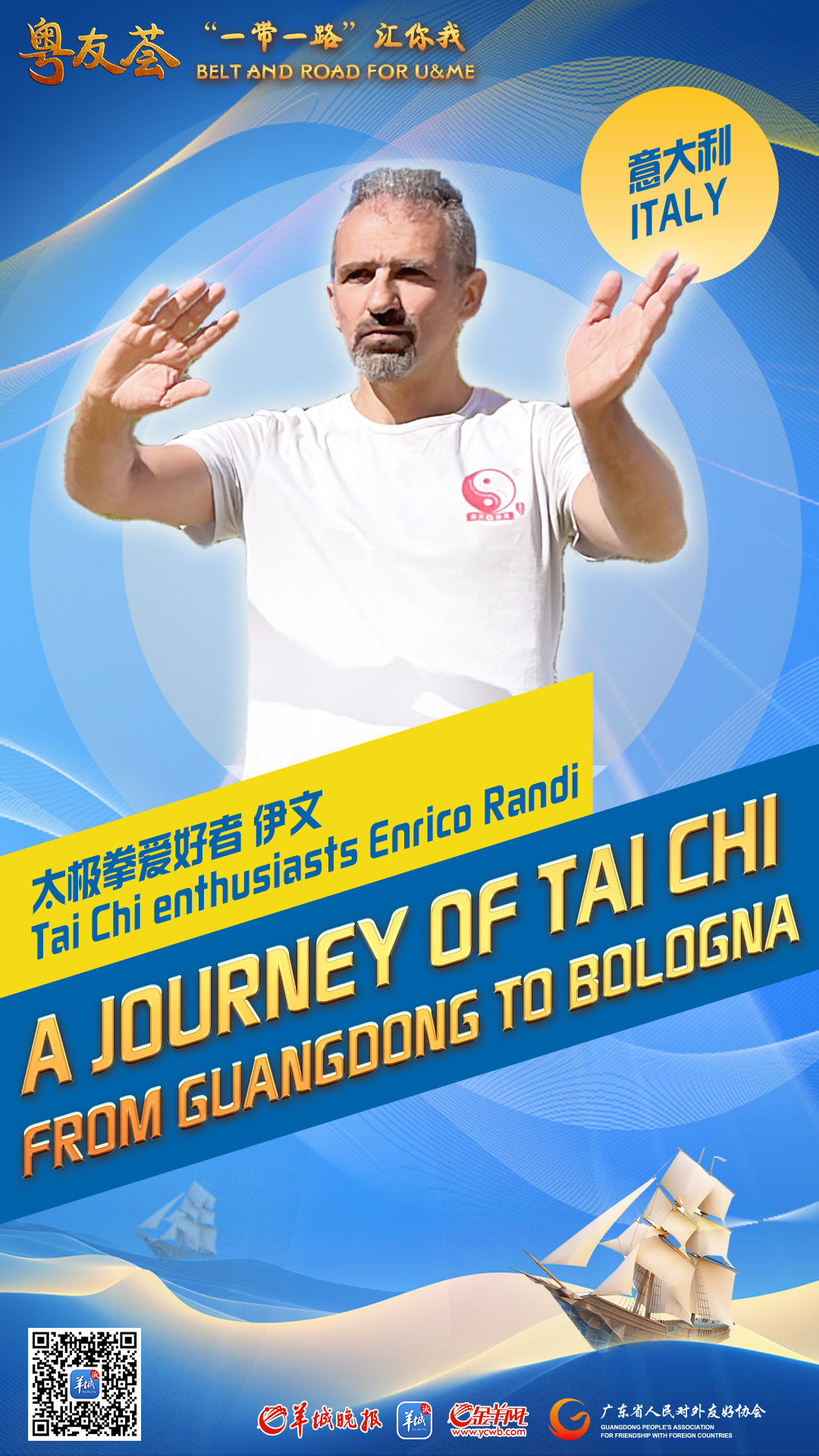


In the morning, under the sunshine in Bologna, Italy, Enrico Randi, an Italian, started his Tai Chi practice. This is the first thing he does every day after waking up, a habit he developed after living In China for seven years.
Tai Chi, a traditional Chinese martial art, was included in the Representative List of the Intangible Cultural Heritage of Humanity in December 2020. This martial art, which integrates Chinese traditional culture, was also one of the important reasons that attracted Enrico Randi to come to China in 2015.
Enrico Randi told the reporter that as early as 2002, he had enjoyed a wonderful two-month journey in China. Enrico Randi visited cities such as Beijing, Chengdu, and KunmIng. He said,"After returning to Italy, I would occasionally think back to my trip to China."
In 2015, he came to China again, not only to experience life in China deeply, but also to learn Tai Chi. After careful research, Enrico Randi found a master surnamed Huang in Yangshuo, Guangxi, specifically to learn Tai Chi.
Breaking through the language barrier is key to learning Tai Chi in-depth. Enrico Randi said that at the beginning, he used a mobile translation app to communicate with his master. As they became more and more in sync, communication became smoother. "Later, I found that sometimes only the master could understand my ChInese while others couldn't," Enrico Randi said with a smile.
In 2018, Enrico Randi came to Guangdong. In Huadu District, Guangzhou City, Enrico Randi found his dream Tai Chi master - Liu Wu, the director and head coach of Shangwu Martial Arts Club.
Enrico Randi said that after gaining a deeper understanding of Tai Chi and the Chinese culture it embodies, he has become a "fan of Chinese culture". He said,"Tai Chi is rooted in Chinese culture, and only by gaining a better understanding of the culture behind it can one truly master this practice."
In September of this year, Enrico Randi returned to Bologna, Italy, with his wife and opened a Tai Chi workshop. Before returning to Italy, Enrico Randi briefly stayed in Spain for six months, durIng which he also took on disciples.
Enrico Randi said that after returnIng to Italy, he found that many Italians were interested in Tai Chi, but it was not easy to find someone who truly understood Tai Chi. "People don't understand the culture behind it and the philosophy it embodies, which is exactly what I want to share with everyone in my teaching."
Tai Chi is divided into different schools. In Italy, Enrico Randi follows the experience taught by his master. In addition, Enrico Randi also introduced traditional Chinese calligraphy in his Tai Chi Chuan workshop. In Enrico Randi's view, Chinese culture is rich in connotation, and he hopes to better understand China through contInuous learning.
Produced jointly by Yangcheng Evening News and the Guangdong People's Association for Friendship with Foreign Countries (GPAFFC)

太极拳爱好者伊文:从广东到博洛尼亚 一位意大利博士的太极拳之旅
清晨,在博洛尼亚阳光的照耀下,意大利人Enrico Randi开始了他的太极拳练习。这是他每日起床后的第一件事,也是在中国生活了7年后养成的习惯。
太极拳,中国传统拳术,2020年12月被列入联合国教科文组织人类非物质文化遗产代表作名录。这一融合了中华传统文化的拳术,也是吸引Enrico Randi于2015年来到中国的重要原因。
Enrico Randi告诉记者,早在2002年,他曾在中国享受了一趟为期两个月的美好旅程。Enrico Randi游览了北京、成都、昆明等城市。他说:“回到意大利后,我时不时会想起在中国的旅行。”
2015年,他再次来到中国,除了要深刻地感受中国的生活外,Enrico Randi还为自己制定了一个目标——学习太极拳。Enrico Randi经过细致了解,在广西阳朔找到了一位姓黄的师傅专门学习太极拳。
深入学习太极拳,突破语言隔阂是关键。Enrico Randi表示,一开始他借助手机翻译软件与师父交流。随着双方越来越有默契,交流变得顺畅起来。“后来我发现,有时候我说的中文,只有师父们能听懂,其他人听不懂。”Enrico Randi笑着说。
2018年,Enrico Randi辗转来到广东。在广州市花都区,Enrico Randi找到了心仪的太极拳老师——尚武会馆馆长兼总教练刘武。
Enrico Randi表示,他更深入地了解了太极拳及其背后蕴含的中华文化后,成为了一个“中华文化迷”。他说:“太极拳根植于中华文化,只有更多地了解它背后的文化,才能更好地掌握这门运动。”
今年9月,Enrico Randi带着妻子回到意大利的博洛尼亚,开设了一家太极拳工作坊。在回到意大利之前,Enrico Randi在西班牙短暂地停留了6个月,其间他还收了徒弟。
Enrico Randi表示,回到意大利后,他发现不少意大利人对太极拳感兴趣,但想找到真正了解太极拳的人并不容易,“大家不了解背后的文化和它所蕴含的哲学,这也正是我想在教学中分享给大家的。”
太极拳分为不同的流派,在意大利,Enrico Randi沿袭了师父传授的经验。此外,Enrico Randi还在他的太极拳工作坊里介绍中国传统书法。在Enrico Randi看来,中华文化内涵丰富,他希望通过不断的了解,更好地读懂中国。
羊城晚报 广东省人民对外友好协会 联合出品
文|羊城晚报记者 谭铮
图|受访者提供
视频 | 王绮静 张惠鑫
-
Y Talk㊸| What did we do in 2023? 回望2023,我们做了什么?
2023-12-29 15:07:46 -
Baiyun Airport handles 2 mn tons of cargo in 2023
2023-12-28 22:13:33 -
Mandarin musical 'I Am What I Am' to premiere in Guangzhou
2023-12-28 22:13:33 -
Video|Masterpiece of Guangzhou clock from Qing dynasty | Master & Masterpieces: Guangdong Treasures④
2023-12-27 22:19:44






